Managing and controlling free range chickens
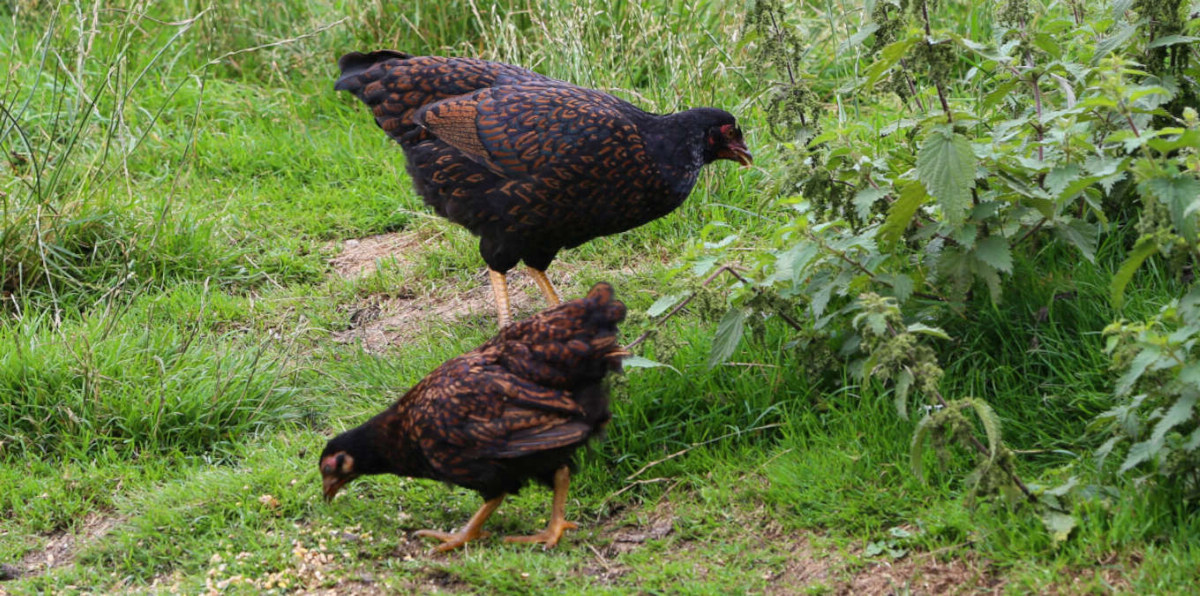
Controlling free-range chickens can be a challenge, as they have the freedom to roam and explore.
Table of Contents
- How to control free range chickens:
- How to keep free range chickens in your yard?
- How do you handle free range chickens?
- How long should chickens be kept in a coop before being free ranged?
- Should free range chickens be fed?
- Are some breeds of chicken better to free range?
- Are free range chickens happier?
- Should chickens be free ranged every day?
- How to keep free range chickens from running away?
- How far will free range chickens roam?
- What do free range chickens eat?
It is a good idea to keep chickens shut in the coop and run for at least three full days and nights before letting them free range. This will give them time to get used to their new surroundings and to learn where their home base is.
Initially it is also a good idea to let them out late in the day so as they do not have time to roam far.
How to control free range chickens:
Provide a safe and secure coop. The coop should be predator-proof and should have a run attached to it. The run should be large enough for the chickens to roam and should be fenced in to prevent them from wandering off.
Establish a home base. Chickens are creatures of habit, so it is important to establish a home base for them. This will help them to know where to come back to at night and will also help you to find them if they wander off.
Use boundaries. You can use physical boundaries, such as fencing, to keep your chickens in a certain area. You can also use visual boundaries, such as trees or shrubs, to help keep them from wandering off.
Provide enrichment. Chickens need to be entertained, just like any other animal. You can provide them with enrichment by giving them things to do, such as scratching in the dirt, dust bathing, or playing with toys.
Supervise them. Even if you have a secure coop and run, it is a good idea to supervise your chickens when they are free ranging. This will help to ensure that they are safe and that they are not getting into trouble.
Choose the right breed. Some breeds of chickens are more flighty than others. If you are concerned about your chickens wandering off, you may want to choose a breed that is less likely to fly.
Start small. If you are new to free ranging chickens, it is a good idea to start with a small flock. This will make it easier to keep track of them and to ensure that they are safe.
Be patient. It may take some time for your chickens to get used to free ranging. Be patient and be consistent with your routine, and they will eventually learn where they are supposed to be.
How to keep free range chickens in your yard?
Chickens love to wander in a never ending hunt for tasty treats and bugs. You can free-range within a larger fenced-in area such as a pasture, a field or even a back yard. Keeping chickens contained in the pen may be a bit of a challenge however.
I have always made the effort to make sure my chickens can free range for at least some of the day.
Below: I have 4 acres to free range my flock in.
Birds that free range on pasture are happier and produce better eggs in my opinion.
There are some disadvantages but I feel the pluses outweigh the negatives when it comes to free range chicken.
Below: Chickens in pasture.
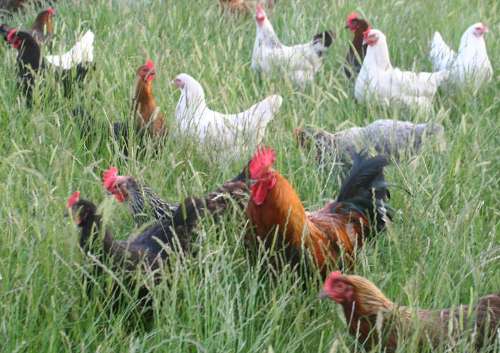
Remember that while fences will help contain your flock, chickens can and do fly over them. How big do fences need to be for chickens.
Some chickens are absolute escape artists and seem impossible to keep in the yard and while fences may help contain chickens, they do little to keep out predators.
The best advice I can give is to limit the time the birds are allowed out to just the afternoons. Most have laid their eggs by that time so will be less tempted to start finding nests in you flower beds.
How do you handle free range chickens?
Tips to make free ranging chickens easier:
- Keep feed and fresh clean water available at all times where your chickens can always access it.
- Get chickens used to their home base so they know instinctively where to come home to.
- Use pot eggs and keep track of the nests.
- Watch out for predators. Trees can help with this as they make chickens safer.
- Fence off your backyard garden and keep any young garden plants or tender flower shoots out of your flocks path since they can be both poisonous or a favourite meal for a chicken.
- Limit free range time.
- Use a movable ark to allow free range behaviour inside the safety of a coop.
How long should chickens be kept in a coop before being free ranged?
Chickens should be kept in their coop for three full days and four nights to make sure they know where home is. This will ensure they know where home is.
Also the first time you let them out should be late in the day. This way they won't wander far before it is time to roost and if you have any problems they will all be close by.
Letting your chickens free range for the first time:
So as your backyard flock enjoy their first time out and about and can continue to free range in a safe manner you should follow a few simple tips for their first time out and about.
- For the first time you let them out do it late in the day. This will ensure that all or nearly all will have laid an egg already and that they won't roam too far in just the one hour or so before their normal roosting time.
- Have treats ready. A few earthworms and some fresh peas go a long way with chickens.
- Don't panic if something goes wrong. If one heads off in the wrong direction use the treats and they will come running.
Should free range chickens be fed?
Yes, free range chickens still need to fed but they will eat less as they are finding some food while they are scratching around.
Below: Chickens allowed to roam on open land and pasture can find as much as 50% of their food.
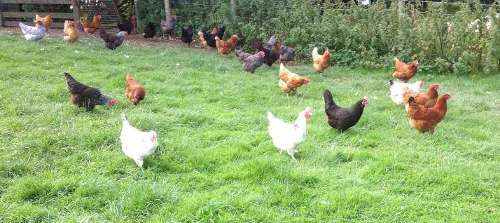
You should always have pellets or feed on tap even for free range chickens.
Are some breeds of chicken better to free range?
Some breeds of chickens are easier to control when free ranging. The large soft feather types tend to be less flighty and easier to keep than some bantams or leghorn types.
In my experience all chickens like to free range.
Below: Large soft feather chickens tend to be easier to manage in the free range environment.
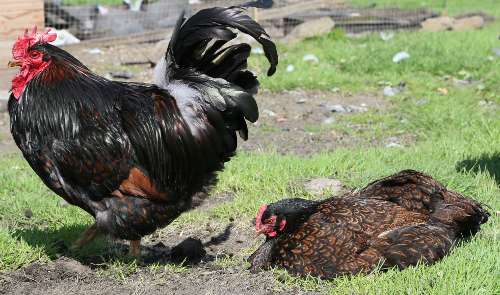
You can make free chickens happier by providing cover and shade for them in the shape of shrubs or small trees.
You can control free range hens by having the feed, water, toys and dust bath in the central area you want them to stay in or return too.
Are free range chickens happier?
Yes. Scratching is a necessary behaviour for chickens and being able to graze on fresh green pasture and hunt for a variety of foods is good for the overall health of your flock and the quality of the eggs.
Free range chickens are also at higher risk.
Below: Free ranging birds fall prey to predators more easily.
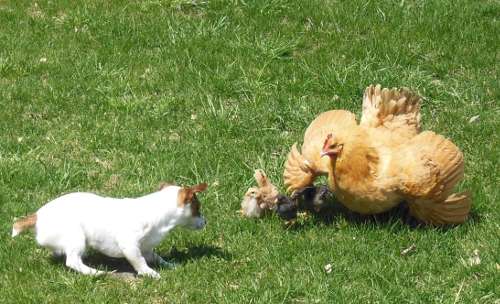
Should chickens be free ranged every day?
Yes, for the most part all poultry needs daily care of some sort. There are days I keep mine locked inside if the weather is really bad or the wind at gale force or above.
I don't let the rain or snow keep them in though, it has to be really bad for me not let them out at all.
How to keep free range chickens from running away?
It is rare that chickens run away from home. They might get chased away by a dog or cat or they may get lost.
As long as you keep your hens in for the first three days, feed and water them properly and keep them and the coop parasite free it is very unlikely you will have to deal with runaway chickens.
How far will free range chickens roam?
Mine never go more than 800 yards from their coop and most never range even half that distance.
I have my chickens in 3 fields on just over 4 acres of land which makes a sort of an L shape. It is longer than it is wide and they are allowed to range anywhere they wish.
Below: The free range chicken coop in the middle of a field.
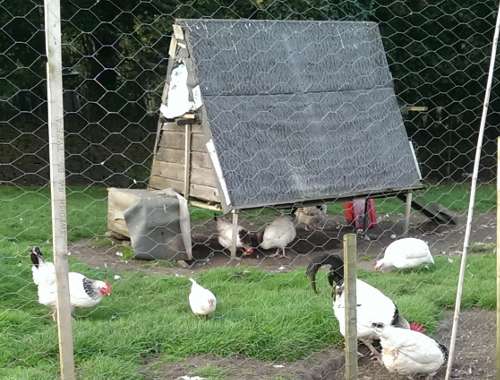
It is possible to just a have a coop and no chicken run when you keep your birds free range. It depends on your predator situation. This one is for my Light Sussex flock and white Guinea fowl. It has an automatic door controller and no run.
What do free range chickens eat?
Chickens are omnivores and free range hens will eat any worms, bugs and insects they can find or catch as well as greens and seeds.
My flock will eat just about anything they can stuff in their beaks including frogs and mice.
